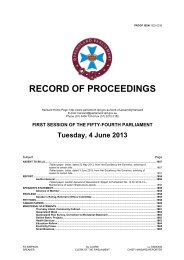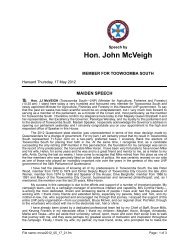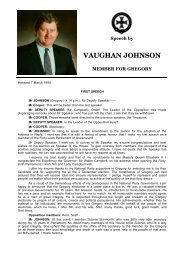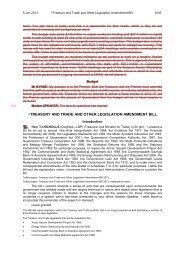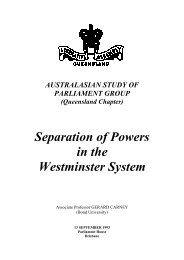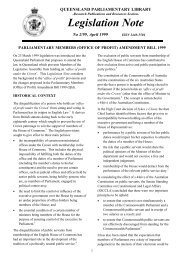weekly hansard - Queensland Parliament - Queensland Government
weekly hansard - Queensland Parliament - Queensland Government
weekly hansard - Queensland Parliament - Queensland Government
You also want an ePaper? Increase the reach of your titles
YUMPU automatically turns print PDFs into web optimized ePapers that Google loves.
23 Aug 2005 Child Safety Legislation Amendment Bill 2631<br />
However, of even greater concern is that the situation is rapidly deteriorating. In recent weeks we<br />
have had confirmation that category 1 notifications have gone unactioned for longer than the acceptable<br />
standard, staff of the department have protested against the minister and there have been strikes by<br />
caseworkers in Ipswich, Toowoomba, Inala and in other offices. There has been serious industrial unrest<br />
at the Sunshine Coast, and I am personally aware of serious unrest in the minister’s own electorate of<br />
Townsville and at other regional offices around the state. Recently, not-for-profit carers expressed their<br />
concern at the department’s inadequate ability to cope.<br />
I signal quite clearly to the minister that the opposition is growing very concerned at the<br />
government’s failure to bring about the anticipated changes in the department. Before the minister says<br />
so, we did not and we do not think that it was possible to achieve the necessary changes overnight.<br />
However, the signals thus far are not good.<br />
In particular, I refer again to the recommendations of the CMC report and to two specific<br />
recommendations. CMC recommendation 5.3 requires the adoption of a verifiable means of calculating<br />
workloads and projecting future staffing numbers. This recommendation, due for implementation in<br />
December 2004, is still overdue. Unless the department is able to ensure the ongoing allocation of the<br />
necessary resources to the new system, the mistakes of the past are likely to be repeated.<br />
I have already mentioned the current unrest in various offices of the department which deal with<br />
case back loads and case loads. This recommendation by the CMC is critical to the success of the<br />
reform process. The simple logic of this recommendation is unavoidable. If there is no proper way of<br />
determining how many staff are needed for the system to work, it will not work. It is no good the minister<br />
going to the media, as he did recently, and saying that the government is going to allocate more money<br />
in the next budget unless we know that those funds are enough.<br />
The staffing recommendations contained in the Forster blueprint were also based on an audit of<br />
case loads undertaken by the implementation unit, which identified a backlog of some 5,000 initial<br />
assessments and estimated an annual increase of 14 per cent in notifications. This audit also identified<br />
an average case load of 32 cases per CSO, compared with the 15 suggested for resource planning by<br />
Gwenn Murray and the CMC, and the international benchmark of 10 which was identified by the Kibble<br />
committee in New South Wales in 2003. As the minister knows, the increase in notifications in some<br />
offices is about 40 per cent, not 14 per cent, and the consequences to the system are inevitable.<br />
Much of the reform agenda is also dependent upon the implementation of an integrated case load<br />
computer system, which is scheduled for implementation in the blueprint by June next year. That is<br />
recommendation 5.17. This system was identified in the CMC report as a matter of the highest priority.<br />
The carer directory element of this system was due for implementation by February this year. That is<br />
recommendation 7.6. It is already behind schedule. In the Courier-Mail of 20 June 2005, under the<br />
heading ‘Foster Care Fix Too Expensive’, a spokesperson for the minister stated, ‘Due to the cost of<br />
delivery of some requirements, a range of alternative options are being explored.’ All the opposition can<br />
say is: we told you so.<br />
In its submission to the CMC, the opposition expressed concern at the build-it-ourselves<br />
approach taken by the department to the development of this computer system. I predict that it will result<br />
in further delays and performance difficulties so that the target date of June next year may be missed.<br />
The opposition has supported the government in its reform of the child-care system but it has reserved<br />
the right to be critical, if necessary. The criticism of delays in implementing these vital recommendations<br />
is valid and we are keen for the minister and the department to respond positively.<br />
The first aspect of this legislation relates to the considerable amount of work the department does<br />
in relation to voluntary care; that is, care that is arranged without a child protection order. The minister<br />
has informed the House that approximately 30 per cent of the department’s work relates to care in this<br />
category. Quite obviously, the same concerns that were identified in the foster care inquiry can also exist<br />
in the voluntary system.<br />
This bill amends chapter 2 of the act to provide a new part 3B, which will regulate voluntary care.<br />
Primarily, voluntary care arrangements will be formalised by a care agreement that parents will enter<br />
into with the chief executive of the department. I note that these arrangements will also permit the child’s<br />
views to be taken into consideration and the ongoing involvement of the parents in the child’s life and<br />
care must be encouraged and facilitated. In addition, the arrangements regarding contact between the<br />
child and the parents must be stated in the agreement.<br />
In this regard, I raise with the minister my concern that this agreement document, particularly in<br />
relation to contact arrangements, has the potential of being too prescriptive. If the agreements are on a<br />
voluntary basis, I encourage the minister and the department, in its application of this legislation, to<br />
include, by default, minimum contact arrangements. I appreciate that in some cases it may also be<br />
appropriate to consider practical maximum contact arrangements. However, I suggest that these be<br />
considered only in specific cases and not be default arrangements.<br />
I also commend the provision that one of the primary considerations is that the intention of these<br />
agreements is the expectation that parents will be able to resume care at the conclusion of the<br />
agreement. This, of course, is the ultimate aim in all child-care arrangements. Similarly, I note that



